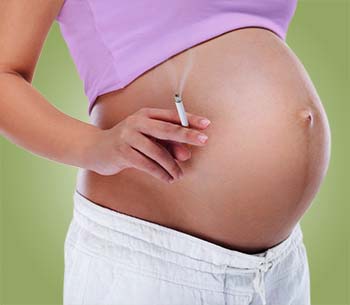- Altered intestinal motility leading to colonic hyper peristalsis and increased rectal pressure
- Excessive caffeine intake in breastfeeding mothers
- Unhealthy maternal diet during pregnancy and post birth
-
Smoking during pregnancy as well as post-partum in mothers is known to increase the risk of Infantile Colic

- Mothers state during pregnancy - distress, anxiety, post-partum adjustment and depression have been linked to development of colic in babies.
- Children with a sensitive and irritable temperament are more likely to suffer from colic.
- Poor parent child interaction
- Method of feeding and faulty positioning of the baby during breast feeding - In particular, ensuring the baby is well positioned may lead to a reduction of colic.
- Colic chances are higher with increasing parental age and lower parity















